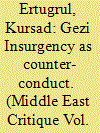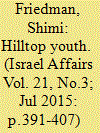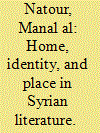|
|
|
Sort Order |
|
|
|
Items / Page
|
|
|
|
|
|
|
| Srl | Item |
| 1 |
ID:
186932


|
|
|
|
|
| Summary/Abstract |
This article defines the Gezi insurgency as a case of ‘counter-conduct’ with a heterotopia in a Foucauldian sense and compares it with similar movements to underline its peculiarity. It argues that Gezi cannot be defined as an ‘anti-austerity’ or ‘anti-dictatorship’ movement. Rather, it was a struggle against the neoliberal-cum-neoconservative conduct under AKP rule and its leadership taking the form of a pseudo-presidential regime. Gezi not only was a search for a different conduct but also a possible self-conduct through self-invention in prefigurative experimentations with different ways of being and practicing direct democracy in the reclaimed public spaces that characterized the action process. What sustained this counter-action process was the spontaneous constitution or deployment of certain platforms like Blok and Çarşı which did not, in themselves, express or represent any given social or political organization nor a corresponding form of a generic identity. In the Gezi insurgency, actors tended to outflow their defining social categories and become a part of the series of performances in which a sense of self-transformation has been common.
|
|
|
|
|
|
|
|
|
|
|
|
|
|
|
|
| 2 |
ID:
165376


|
|
|
|
|
| Summary/Abstract |
This article offers an analysis of the prominent Egyptian novelist Sonallah Ibrahim’s literary critique of neoliberal Egypt in a selection of his novels: al-Lajna (The Committee, 1981), Dhāt (Self, 1992), and Sharaf (Honor, 1997). It argues that Sonallah Ibrahim makes strategic use of space in his novels as heterotopias of the neoliberal Egyptian state. Heterotopia, here, refers in the Foucauldian sense to a site of deviation, exclusion, and non-normativity that is capable of reflecting the totality of normative order. In Ibrahim’s novels, the heterotopias of the neoliberal state are both narrative and formal. They are spaces in which narrative action takes place as well as specific formal sites in the representational space of the text conveying non-narrative discourse. As such, this article explores the interplay between narrative and representational space in the construction of Sonallah Ibrahim’s critique of the neoliberal Egyptian state.
|
|
|
|
|
|
|
|
|
|
|
|
|
|
|
|
| 3 |
ID:
139244


|
|
|
|
|
| Summary/Abstract |
In the first decade of this century, a new social group, popularly called the ‘hilltop youth’, came to the attention of Israeli society. This group consisted of a small number of young people who took part in aggressive political actions including illegal settlement endeavours throughout Judea and Samaria. Before their arrival at the various wilderness outposts, these youth had not developed any political outlook in regard to Jewish settlement in these areas; it was only during their period of habitation did they tend to adopt and utilize views informed by ideological and cultural extremism. The manifestation of this socio-political phenomenon will be analysed from sociological and anthropological perspectives in order to shed light on social aspects of Israeli society, as well as to elucidate frequently unclear political and policy implications in the larger Middle Eastern context. In addition, this article describes the significance of a youth subculture that has emerged in this frontier political space, and which has often been cast in criminological terms. To buttress the claims advanced in this study, a psychological-sociological approach is also employed.
|
|
|
|
|
|
|
|
|
|
|
|
|
|
|
|
| 4 |
ID:
184738


|
|
|
|
|
| Summary/Abstract |
This study explores the juncture of home, liminality and counternarrative in contemporary Syrian literature produced after the eruption of the revolution in 2011. As a case study, I examine how Maha Hassan’s Drums of Love and Ghassan Jubbaʿi’s Qahwat Al-General redefine the concept of home through heterotopic and utopic representations of the place. The study demonstrates that in both works a real sense of home proves unattainable. When the protagonists seek a place for themselves in a home that enjoys freedom and justice, the home denies them. Utilising Bakhtin’s notion of polyphony, I investigate how both works represent a multiplicity of oppressed voices in a ‘home’ that imprisons and estranges everyone. Both texts bear global messages, inviting their readers to examine the complexity of the status quo in Syria through subjecting all-encompassing representations of the revolution and resisting oppression to a process of contestation. Finally, I argue that the unattainable sense of home depicted in the novels marks such texts as a part of the enduring legacy of the Syrian revolution and its causes, and thereby they may foreground solidarity among Syrians who continue to suffer the loss of home.
|
|
|
|
|
|
|
|
|
|
|
|
|
|
|
|
|
|
|
|
|